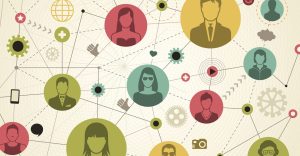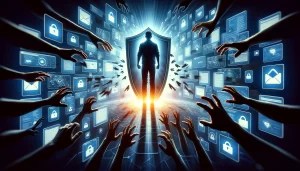
AI will lead us towards extreme inequality under the current economic system
Right now more than ever we see how AI technology changes our lives. During the pandemic, we started to spend more time at home. We see our colleagues, friends, and loved ones via Zoom, have our groceries delivered directly to our doorstep, and make friends on our smartphones. But if we leave the obvious advantages that AI technologies offer for the privileged and look underneath the surface, then it becomes clear that the arrival of AI in everyday life is one of the most momentous challenges for our socioeconomic system and how we relate to each other as a society. Even now we see that the gap between the rich and the poor is increasing rapidly. In the US during the Covid-19 pandemic alone, billionaires including tech oligarchs like Jeff Bezos, increased their net worth by more than $1 trillion whereas twenty million Americans lost their job. If AI systems continue to stay in the hand of a few companies like Amazon and Google it will result in a super-rich oligopoly of billionaires which will hoard the wealth produced by AI leaving the vast majority of society behind. If we don’t change our economic system AI will lead us towards extreme inequality and bring us on the edge of a social crisis.
The laws of capitalism are changing through AI technology and algorithms. An interesting paper looks at these changes from an alternative Marxist perspective. One of the changes appears in the mean and factors of production. According to Marx, the factors of production contain everything from labor, subjects of labor, and instruments of labor. The new capitalist landscape is driven by data and information. This new “data capital” offers a new way to generate wealth that undermines the traditional labor theory by Marx. The labor theory argues that the value of products is measured in hours of labor. For example, the medium hours to produce a pair of shoes is twice as high as the hour to produce a T-shirt. Therefore the value of the pair of shoes is twice as much. This theory is now undermined by the fact that physical products are moved into digital formats. This process is called datafication and is enforced by the new form of capital namely data and information. One example of datafication is the business model of Netflix. Formerly Netflix was a physical shop where you could rent DVDs by mail. The process began when Netflix turned to its purely only streaming model. With this de-materialization and datafication, Netflix was able to get a rich and varied data source from every subscriber which can be used and manipulated to provide the perfect offer of films and series for the consumer. This goes so far that Netflix is now also one of the largest producers of films that are adapted to the needs of the consumer. This process of datafication and de-materialization using Big Data analysis has removed the need for labor hours to produce the value of products. Physical labor is therefore completely detached from the value-creation process by AI technology.
AI technology does not only affect the process of how the value of goods is created it also changes the relation between the so-called bourgeoisie, the people that own the means of production like factories, machines, etc., and the working class who produce the goods and services. Marx argued in Das Kapital that traditionally workers sell their workforce to the bourgeoisie that owns the factories, the means of production where and which trough goods and services are produced. This relation is completely inverted in the modern capitalist system. Contemporary tech companies do not produce products, they do not own machines or factories. Internet platforms like Amazon and Alibaba own the gateway to the internet, and consumers of internet services produce their own products by uploading photographs, videos, text messages, reviews, etc. on Facebook, Instagram, AirBnB, Spotify, etc. The consumer becomes a prosumer. The consumer itself produces the commodity “data” and then consumes internet services that are directly tailored to his data. Another way this new relation between the bourgeoisie and proletariat can be seen is the uprising in so-called sharing economies. Companies like Uber and AirBnB are excellent examples of the disentanglement of ownership of the means of production and the value that is created. In the example of Uber, the owner of the means of production (car) are the drivers, and the customer is the owner of a smartphone or some kind of internet access. The only thing that Uber owns is the possibility to connect the customer and the driver. In the modern capitalist system, the distribution of the means of production is turned upside down while the power relations remain the same. The so-called “neo-proletariat” owns the means of production like cars, properties, etc., creating value but at the same time not owning any real power. Simultaneously, the neo-bourgeoisie only owns the means of connection for basically zero costs but has a monopoly power with high profits. This new relation between the bourgeoisie and the working class plus the disentanglement of labor and production of value has the potential to further expand existing societal rifts and class conflicts.
AI technology will not only transform the laws of the economic system itself, it will also have a major impact on jobs and labour. The manless factory where only robots work is probably the dream of many capitalists, factory owners, and tech enthusiasts. No spending on wages, high productivity, infinite working hours, no breaks – because robots can work non-stop. Since we cannot exactly predict the future, there are different forecasts of how AI and robotics will change the workplace. In a report from the World Economic Forum from 2020, it is argued that AI will displace many jobs but will at the same time create more jobs. The report also states that AI will primarily “automate many repetitive and sometimes dangerous tasks like data entry and assembly line manufacturing”. The low-skilled workers should be re-trained so that they can focus on “higher-value and higher-touch tasks”. This upskilling should be provided by employers. The World Economic Forum stirs up a very benevolent future of how AI will change jobs.
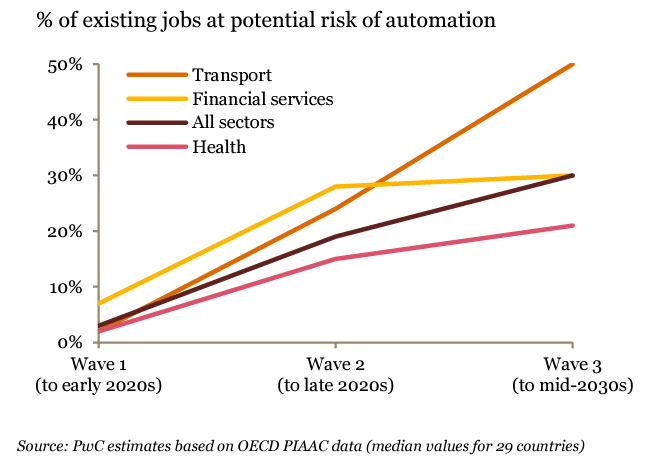
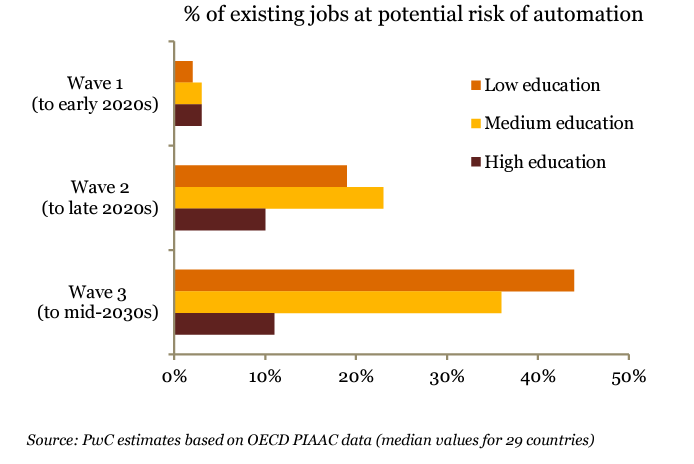
But a more plausible variant is shown in the book Automation and the Future of Work by Aaron Benanav. Benanav argues that we are not at the edge of a new digital age where robots replace workers to obtain unlimited productivity but we are in the middle of economic stagnation. The problem of this economic stagnation is a problem of capitalism itself. Companies always compete with each other by using more and more labor-saving technology. This has the effect that the reserve army of labor (unemployed) is growing. When the reserve army of labor is growing people have to sell their workforce for less money. Wages are pushed down so that in the end it is still more profitable to employ people than to use machines. Amazon for example does not develop technology that could augment worker productivity but instead invests in surveillance technology to ensure higher productivity from warehouse workers. That said, the possible future of robots and AI displacing the working class will probably not come as quickly as hoped. But when it will come eventually, it is questionable if employers will really take care of their workers as the report from the WEF suggests.
It was pointed out above that the changes that AI technology brings to the economic system create more and more sharing economies or gig economies. These sharing economies already have a devastating impact on workers and trap them in a precarious existence. Companies like Uber and Deliveroo promise flexible and independent work. But these promises do not benefit everyone equally. A report by the digital think tank Doteveryone points out that workers lack financial security and a loss of dignity. Workers in this field have high risks and huge expenses. Uber drivers have to pay for their own insurance and gas. Additionally, algorithmic tracking is damaging the mental health of workers. These new kinds of jobs offered by tech firms lead to more and more people no longer being able to make a living from their jobs. Another example of how self-employment exploits workers is that of Amazon Mechanical Turk. AMT is a crowdsourcing website for businesses to hire remotely located “crowdworkers” to perform discrete on-demand tasks. Often these tasks are trivial data labeling tasks to train machine learning algorithms. A research paper analyzed millions of tasks on Mechanical Turk and found that the median wage was about $2 per hour.
These developments on the job market show that AI technology itself and the changes in the economic system produced by AI amplify the exploitation of the working class and lead to more inequality, precarity, and insecurity in society.
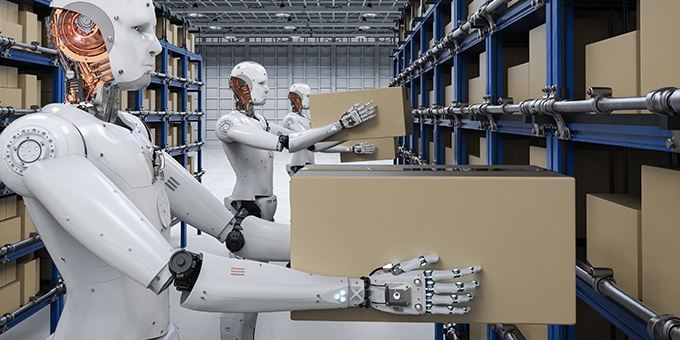
But what is it going to happen next if technologies are already having negative effect on society? AI is gonna get smarter and machines are gonna get stronger and more precise, does it mean we are all doomed? Or will we overcome every problem and human struggle thanks to this miraculous technology? Many have talked about a semi or fully automated society, speculating on how our lives will be reshaped and how such a future will look like for those who will be present to live it. Often though, this kind of scenario is superficially portrayed with heavenly words, as a utopian dream where the leisure of men is finally at the center of our lives. Unfortunately, it is safe to say that this dream will stay one, at least if we don’t overcome our current economic system and start running in the right direction to chase it.
Robots and machines are in fact simply more precise and efficient and when equipped with AI they can also handle an extra amount of complex tasks. At the same time it is deep in the capitalist nature to do what is more profitable and therefore, when human workers become more expensive (they already are), nobody will be there to stop the turnover. Sure, some new jobs will emerge but this will not be the case for the innovative large-scale upskilling, considering that such jobs will not be in a sufficient amount and will require high-level skills and education that only a few of us can get access to and adjust in little time. In an upcoming widespread automation future under the current capitalist system, three social classes will possibly emerge: at the top, an elite owning the machines and directly benefiting from their productivity force. Below them, those who will still have some kind of job: mostly either high skilled profiles employed in the design and maintenance of the algorithms and machines, or services providers for the rich (these will also represent a minority of the population), and lastly, at the bottom, the vastest portion of the population, whose adequate living conditions will not be granted. The presence of a huge jobless mass represents a radical factor that changes the capitalist paradigm itself as well. Workers rely on wages to live while capitalists rely on workers to produce (and also to consume). Once this delicate equilibrium goes missing and the workers become to no purpose, inequality will be unprecedented. Another consequential issue is that the elite would have a technological monopoly and hence also on weapons, having therefore the ability to suppress violently any kind of resistance that the lower class could raise in the act of asking for a more fair society.
Such a dark future resembles some of the dystopian science fiction that we are accustomed to see on the screens such as Blade runner or even Hunger Games, but are not for this reason to be undermined. In his book , Adam Frase takes this analysis further, designing four possible post-capitalistic widespread automation futures based on socio-political structures and the eventual resource’s scarcity. Two of them are based on a hierarchical and classist society as previously described: Exterminism and Rentism. In Exterminism (hierarchy and scarcity), resources are very limited (due to climate change and the exhaustion of non-renewable energy) and the elite who own them are not reliant on the working class anymore. They would do anything to hold on to their privileges, protecting them self from possible escalation by living in highly protected areas and even resorting to population control. Rentism (hierarchy and abundance) on the other hand represents a future where there is enough resources for everybody to live, but all the goods and the means of production are still in control of one small portion of the population, who holds it carefully through intellectual property and grants to the lower class what is enough to leave and keep consuming. Frase also theorizes other two possible scenarios where egalitarianism has been adopted: Socialism (egalitarianism and scarcity) and Communism (egalitarian and abundance). In Socialism the need to oppress the working class disappears, but a new challenge originates of managing equally a limited amount of resources. Through economic planning this would be possible but where there is scarcity there would probably still be some kind of political debate and eventually, somebody making decisions. People would likely have enough goods granted and more freedom from work, but still some limitations on how much they can consume. Lastly Communism, where everybody is equal and there is abundance of resources. Little working hours if none would be required and everybody would be able to pursue their hobbies, projects and whatever fulfills them without worrying about the idea of working for a wage in order to survive.

Apart from the famous Star Trek (where AI and machines take care of the productions and the services and humans are left to do what they want), such post-scarcity communist economies have been hypothesized for a while now and all of them revolve around the idea that all people can access their basic survival needs as well as some significant proportion of their desires for goods and services. Now more than ever what can lead us out of scarcity and resource competitions is the wealth and the production increase caused by Artificial Intelligence and Automation progresses. One of the most accredited instances of this idea is Fully Automated Luxury Communism, a politics presented by Aaron Bastani in his homonym book where he discusses how and what could lead us towards a post-scarcity egalitarian society, starting for example from Universal Basic Services (free housing, healthcare, instruction etc.). Needless to say, post-work organization and post-work mentality will be a factor not to undermine (right now our social fabric and individual lives mostly revolve around work), and for sure other issues will be raised as it will be experimenting a new kind of societal and economic system with unprecedented initial condition, but at least there could be no more economical or physical exploitation and living condition disparities among people.
If some of these theories may sound very far or even unachievable to some ears, at least the idea of some kind of Universal Basic Income (UBI) is surely more concrete than ever. The concept itself, an income paid by the government to every adult for basic sustainment, can be first traced pretty far in time, but it is only in recent history where it gained popularity. Being mostly associated with left ideals, as a chance to fight poverty and promote a redistribution, it has also received endorsements from various side of the political spectrum: Frederich Hayek for example, father of the modern capitalism, supported it as a way to ensure people from adversity as well as an efficient social and economical measure to make sure that everybody keep contributing to the market even if he can’t provide for himself. In recent years, more and more people started to seriously talk about it, as AI and automation really call for the implementation of such a measure in order to protect those who will be out of job soon. Even Andrew Yang, democratic candidate at the US elections in 2020, made the UBI of 1000$ for every American his signature policy, as a response to job displacement in the next future.

As far and fictional as they may sound, we truly believe that some of the dystopian futures described are possible, and today’s data show how real the incoming changes already are. “Socialism or Barbarism” is the famous slogan attributed to Rosa Luxembourg and personally, after reading and reflecting on the topic, it makes more sense then ever. Capitalism is destined to collapse and escalate in extreme inequality and a dark future for the lower classes and that is why we are urged to think about post-capitalistic economies in which the benefit of AI and machines is equally shared.
Popular press frequently portrays automation as either a great news to humanity and forever freedom from work or a dystopian nightmare of human misery, but too often it misses the most important points which are social chances and political choices. It might sound obsolete to talk about a class struggle in a post industrial society, and that is because most of the lower class comes to term with the undergoing exploitation being blinded by the purely materialistic dream of having more than their neighbors. Nevertheless, because of AI and the social changes following it, we now have the chance to rethink the structure of our society and actively make a choice to start walking in the direction of a more egalitarian civilization.
It is not only a threat to avoid but also an opportunity to take.
